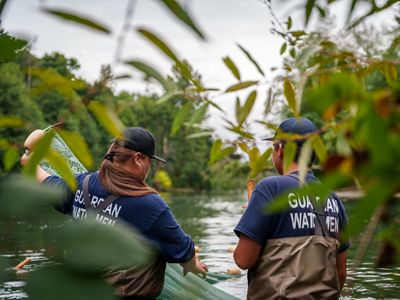
Media Contacts
-
Jacqueline Nunes
Phone: +1 437-291-3287
Email: jacqueline.nunes@natureunited.ca
As Nature United prepares to attend the 16th Conference of the Parties to the United Nations Convention on Biological Diversity (COP16) in Colombia this month, we are urging the Government of Canada to accelerate partnerships with Indigenous Nations and communities, farmers and foresters, as well as Provinces committed to delivering solutions for nature and climate.
“Indigenous Peoples, farmers and foresters are among those most impacted by biodiversity loss and climate change. They are also essential for building resilient, inclusive and competitive local economies,” says Hadley Archer, Executive Director of Nature United.
“As world leaders prepare to reconvene at COP16, it is essential that Canada demonstrate how its 2030 Nature Strategy is translating into the sorts of sector strategies, innovative funding and transformational partnerships that can unlock these communities’ potential contributions to the continued prosperity of people and our planet.”

Two years since the Government of Canada brokered the historic Kunming-Montreal Global Biodiversity Framework (KMGBF), which unites 196 countries around the actions needed to reverse the decline of biodiversity, Nature United is calling on the Government of Canada to demonstrate progress in three key areas:
- Large-scale Indigenous-led conservation: Since 2022, Indigenous governments, communities and organizations have worked diligently to uphold their end of the partnerships struck when Prime Minister Justin Trudeau announced support for the establishment of large-scale Project Finance for Permanence (PFP) projects in British Columbia, Northwest Territories, Northern Ontario and Nunavut at COP15. Now, at COP16, the Government of Canada must confirm the steps it will take to close these agreements in the coming weeks, and clearly demonstrate to the world that this globally significant commitment is on track.
- Sustainable Agricultural Growth: After almost two years of deliberations towards the development of a 25-year Sustainable Agriculture Strategy, producer and industry associations, agri-food companies and ENGOs want to see results. At COP16, the Government of Canada must outline its plans to work differently with actors across value chains, and to invest in farmers and ranchers to improve the health of their soils, while maintaining productivity of the food, fibre and fuel that Canadians and the world depend upon. In that context, Nature United is working with agri-food leaders to call for the announcement of a Sustainable Agricultural Growth Initiative that will support action at scale to restore the power of agriculture to deliver solutions for nature, climate and rural prosperity.
- Manitoba Nature Agreement: Conservation must uphold Free Prior and Informed Consent and provincial jurisdiction. Done right, it can be an engine of reconciliation and effective federalism. Existing Nature Agreements with several provinces and Indigenous Nations can inform similar agreements across Canada. Indigenous organizations in Manitoba and the Provincial government have signaled their desire to work with Canada to reach an agreement for achieving 30x30 and other GBF-related targets. At COP16, the Government of Canada should reaffirm support for Indigenous engagement in the development of a Manitoba Nature Agreement. This will allow Crown governments, rightsholders and land owners to collaborate to protect ecosystems and habitats, and find more sustainable ways of managing natural resources and species that underpin local economies, cultures and ways of life.
These priorities align with the key themes for COP16, which will take stock of countries’ plans and efforts to implement the Global Biodiversity Framework, with an emphasis on financing implementation and mainstreaming biodiversity in policies and sector strategies.
Nature United will be attending COP16 along with colleagues from our global affiliate, as well as Indigenous partners advancing visions for the protection of their traditional territories and waters.
Nature United was founded as a Canadian charity in 2014, building on decades of conservation in Canada. Headquartered in Toronto, our organization has field staff located across the country. Nature United supports Indigenous leadership, sustainable economic development and science and large-scale conservation, primarily in British Columbia, the Northwest Territories and Manitoba. Our organization is also working to accelerate Natural Climate Solutions at national and regional scales. To learn more, visit natureunited.ca or follow us on Linkedin, Instagram and Facebook.
We are the Canadian affiliate of The Nature Conservancy, a global conservation organization with more than a million members and a diverse team that includes more than 400 scientists. Our global organization works in more than 80 countries and territories — either directly or through partnerships — to conserve the lands and waters on which all life depends. To learn more, visit www.nature.org or follow @nature_press.